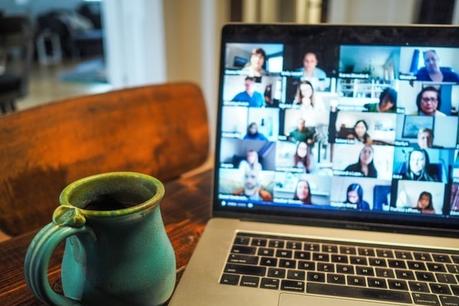
A sense of safety may be the last thing on your mind when your home is your office. You have everything you could need at arm's reach, you start the day without even having to walk outside, and your doting cat never leaves your lap except to occasionally pound the keyboard at random. You spend the day on calls, chats, Zooms, and email exchanges with others. Surely you aren't alone when all these interactions are happening.
However, your brain and nervous system, which developed eons before Zoom technology came around, may not always get this message. In truth, you're kind of alone (in your house) at the same time that you're kind of not (with many other faces on screen).
Here's why feeling safe in online meetings matters:
Being around others is a hardwired need.
The human brain is hardwired with a basic need to have other people around from day one. Many other animals can walk quickly after birth and become independent; giraffes, for example, walk within 30-60 minutes of being born. Human infants, however, are completely helpless and dependent on caretakers for survival. Because the presence of others is essential, our brains are wired with a distress system to alert us to any loss of human connection.
The brain can be uncomfortable without others around.
The brain is wired to equate being in the presence of other people with a sense of safety and comfort-and to get a bit uncomfortable if left alone.
In a typical, old-fashioned office day, our social needs used to be easily met by casual interactions in the office or even a smile from a stranger on the subway. These small interactions would add up and reassure the brain that others were around.
During a remote workday, this may not be the case. Without the commute, without the water cooler, and perhaps without a roommate, you may go longer than usual without in-person human connection. Whether you're an extrovert or an introvert, that can translate into a problem for your brain. It's not designed to be away from others for too long.

An uncomfortable brain will interfere with your attention and engagement.
As Diane Lennard, Ph.D., and I explain in our book Humanizing the Remote Experience, paying attention is a complex process that involves six separate steps. The very first step is called alerting.
Alerting is coming into an internal state of mind in which you're ready to receive and respond to sensory information. Alertness can range from a very low level (asleep) to a very high level (vigilant). It's modulated by a neurotransmitter, a chemical the brain uses to communicate between cells, called norepinephrine.
When norepinephrine is low, you're either asleep or would like to be. When norepinephrine is high, you're hypervigilant and on high alert. Neither of these brain states is optimal for complex thought or creative work. Indeed, the brain's concentration abilities are at their sharpest when norepinephrine, and thus alertness, are at a happy medium. At this midpoint, you're alert but not hyperalert, calm, but not falling asleep. Here, your brain is able to effectively focus where it needs to.
This happy medium of alertness can only happen when you feel safe in your environment. Safety is a prerequisite for alertness, just as alertness is a prerequisite for focused attention. If your nervous system deems your environment to be unsafe or threatening, you'll be unable to concentrate well. And because humans are wired for connection, safety and comfort often require the actual presence of other people.
So, the next time you're having a bit of trouble focusing or settling into your routine, consider whether this is a warning sign that your nervous system isn't entirely settled.
Pause your work and take action to convince your nervous system that you are safe. Meet up with a friend or co-worker. Take a walk around the block and smile at strangers. Go to the store and spend a few extra minutes with the cashier. The brief break in productivity will result in higher productivity overall when you enable your brain to be in a happy, focused state.
This guest post was authored by Dr. Amy Mednick

******
Ms. Career Girl strives to provide valuable insights you can use. To see more from our columnists and guest authors, check these out! Or subscribe to our weekly email featuring our latest articles. We're also present on Medium!

Ms. Career Girl was started in 2008 to help ambitious young professional women figure out who they are, what they want and how to get it.

